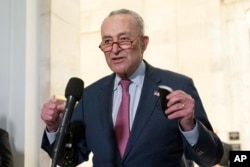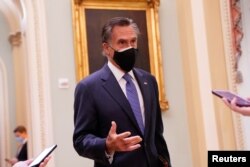Senate bargainers have reached agreement on a slimmed-down $10 billion package for countering COVID-19, the top Democratic and Republican negotiators said Monday, but the measure dropped all funding to help nations abroad combat the pandemic.
Senate Majority Leader Chuck Schumer, a Democrat from New York, said the deal would give the government "the tools we need" to continue battling the disease. Senator Mitt Romney, a Republican from Utah, trumpeted budget savings in the measure that he said meant it "will not cost the American people a single additional dollar."
At least half the measure would have to be used to research and produce therapeutics to treat the disease, according to fact sheets distributed by Schumer and Romney, the two top bargainers.
The money would also be used to buy vaccines and tests. At least $750 million would be used to research new COVID-19 variants and to expand vaccine production, the descriptions said.
The agreement comes with party leaders hoping to move the legislation through Congress this week, before lawmakers leave for a two-week spring recess. It also comes with BA.2, the new omicron variant, expected to spark a fresh increase in U.S. cases. Around 980,000 Americans and over 6 million people worldwide have died from COVID-19.
Schumer blamed the GOP for the lack of global assistance, saying he is "disappointed that our Republican colleagues could not agree to include the $5 billion" from an earlier version of the measure. He said members of both parties want to craft a second spending measure this spring that could include funds to battle COVID-19 and hunger overseas and more assistance for Ukraine as it continues battling the Russian invasion.
Romney suggested an openness to considering future COVID-19 money. "While this agreement does not include funding for the U.S. global vaccination program, I am willing to explore a fiscally responsible solution to support global efforts in the weeks ahead," he said.
The accord represents a deep cut from the $22.5 billion President Joe Biden initially requested, and from a $15 billion version that both parties' leaders had negotiated last month. House Speaker Nancy Pelosi, a California Democrat, abandoned that plan after Democratic lawmakers rejected proposed cuts in state pandemic aid to help pay for the package.
The $15 billion plan had included about $5 billion for the global effort to fight COVID-19, which has run rampant in many countries, especially poorer ones. The overall price tag has shrunk, and the global money has fallen off, as the two parties have been unable to agree on more than $10 billion in budget savings to pay for it.



